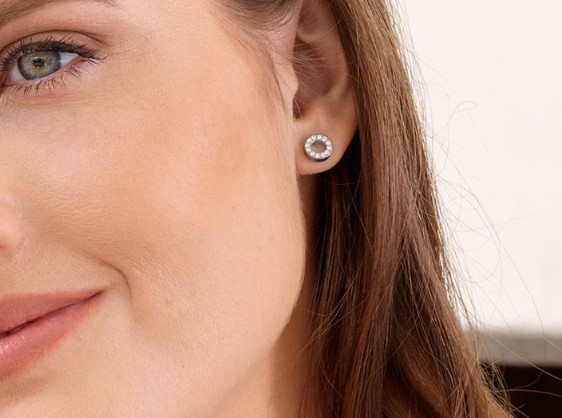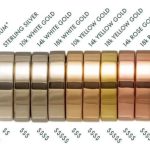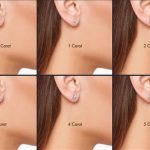Sensitive ears demand extra care, especially when it comes to earrings. Many people experience irritation, redness, or allergic reactions from certain metals, making everyday wear uncomfortable. Finding earrings that combine both style and comfort can feel challenging, yet it is possible with the right knowledge.
Materials like surgical steel, titanium, and 14k gold reduce the risk of irritation and provide a gentle touch on delicate skin. Lightweight designs and hypoallergenic coatings also play a major role in ensuring a pain-free experience.
Beyond material, the shape and size of the earring influence comfort, preventing tugging or pressure on the earlobe. Selecting earrings suitable for sensitive ears allows individuals to express personal style without compromising on ear health.
This guide explores the best options available, helping readers make informed choices that keep their ears happy while staying fashion-forward. Comfort no longer has to mean sacrificing style.
What Earrings are Best for Sensitive Ears?
Sensitive ears can make wearing earrings uncomfortable. Some people experience itching, redness, swelling, or even small bumps after wearing certain earrings.
The cause usually comes from the material, weight, or design of the earrings. Choosing the right type can prevent irritation and make earrings safe and enjoyable to wear. This guide explains the best options for sensitive ears.
Why Earrings Irritate Sensitive Ears
Earrings irritate skin mainly because of metal allergies. Nickel is the most common cause. Even small amounts can trigger reactions. Other metals like copper, brass, or cheap alloys may also cause irritation.
Design and weight affect comfort too. Heavy earrings pull on earlobes. Long or dangling styles increase friction. Even high-quality metal can irritate if the design is harsh or the earrings are worn too long.
Poor cleaning habits also lead to irritation. Dirt, sweat, and bacteria on earrings or earlobes can cause infections.
Best Materials for Sensitive Ears
1. Surgical Stainless Steel
Surgical stainless steel is strong, durable, and rust-resistant. It contains very little nickel, so most people do not react to it. These earrings suit everyday wear and new piercings.
2. Titanium
Titanium is lightweight, strong, and hypoallergenic. Sensitive ears tolerate titanium well. Its lightness reduces stress on the earlobe. Many hospitals use titanium for surgical implants because it rarely causes reactions.
3. Niobium
Niobium is less common but extremely safe. It does not contain nickel. Niobium earrings resist tarnish and corrosion. Anodized niobium adds color without affecting skin safety.
4. High-Quality Gold (14k and 18k)
Gold is safe if it is pure enough. Avoid gold-plated or low-karat gold earrings, which often contain nickel. Yellow gold usually irritates less than white gold. Gold lasts long and keeps a shiny finish.
5. Platinum
Platinum is hypoallergenic and durable. Rarely causes allergic reactions. Platinum earrings are a safe investment for sensitive ears, though they are more expensive.
6. Medical-Grade Plastic or Acrylic
Plastic or acrylic earrings work for people allergic to metal. Choose medical-grade or FDA-approved plastic. Avoid cheap plastics with unknown chemicals. They can cause irritation or skin rashes.
Earring Designs That Suit Sensitive Ears
Stud Earrings
Studs are small and light. They reduce stress on the earlobe. They stay in place and irritate less than heavy styles. Daily wear is comfortable.
Hoop Earrings
Thin hoops are ideal for sensitive ears. Heavy or thick hoops stretch the earlobe and may cause pain. Small to medium hoops are safer.
Dangle or Drop Earrings
Long or heavy drops increase friction and pressure. If worn, choose lightweight options made from safe metals. Limit wearing time.
Clips or Magnetic Earrings
Non-pierced earrings avoid piercing entirely. Clips and magnetic earrings press on the earlobe without going through skin. Sensitive individuals often find these comfortable.
Tips to Protect Sensitive Ears
-
Clean earrings with mild soap and water before wearing.
-
Wash ears gently with saline solution or mild soap.
-
Rotate earrings; do not wear the same pair every day.
-
Remove earrings before sleeping, swimming, or exercising.
-
Check for early signs of irritation like redness, itching, or swelling.
-
Avoid tight earring backs; friction can cause irritation.
-
Store earrings in a dry, clean place to prevent bacteria or tarnish.
Extra Information
Nickel-Free and Hypoallergenic Labels
Look for “nickel-free” labels. True nickel-free earrings are less likely to trigger allergies. “Hypoallergenic” is helpful but not a guarantee. Test new earrings on skin for a few hours before long wear.
Weight and Comfort
Even safe materials can irritate if earrings are heavy. Consider light, simple designs. Small hoops, studs, or thin drops reduce pressure on sensitive earlobes.
Piercing Care
Fresh piercings need extra care. Use titanium, surgical steel, or high-karat gold. Clean ears twice daily with saline solution. Avoid touching new earrings with dirty hands.
FAQs
1. Can sensitive ears wear sterling silver earrings?
Yes. Sterling silver (92.5% pure) is usually safe. Avoid cheap silver-plated earrings that may contain nickel.
2. Are fashion or costume earrings safe?
Many contain nickel, low-quality alloys, or chemicals. These can cause rashes and irritation. Choose metal-free or hypoallergenic options.
3. How do I test earrings for sensitivity?
Wear new earrings for one hour. Remove them and check for redness, swelling, or itching.
4. Does the weight of earrings matter?
Yes. Heavy earrings pull on earlobes and increase irritation risk. Light earrings are safer.
5. Can sensitive ears wear new piercings?
Use titanium, surgical steel, or high-quality gold. Avoid alloys or cheap metals. Clean daily to prevent infection.
6. How often should I clean earrings?
Clean earrings before first use and weekly afterward. Fresh piercings require daily cleaning.
7. Can I wear different types of earrings in each ear?
Yes. You can mix metals or styles. Choose hypoallergenic materials for each ear to avoid irritation.
Final Thoughts
Sensitive ears require careful attention to materials, design, and care. Metals like surgical stainless steel, titanium, niobium, high-quality gold, and platinum reduce the risk of irritation. Light, simple designs protect earlobes from pulling and friction.
Daily cleaning and mindful wear help prevent infections and redness. Choosing the right earrings ensures comfort and safety. The best earrings for sensitive ears combine skin-friendly materials, lightweight designs, and proper hygiene, allowing stylish, pain-free wear.




